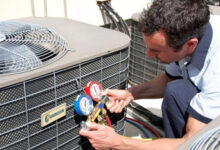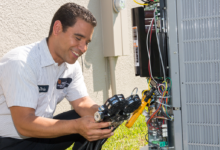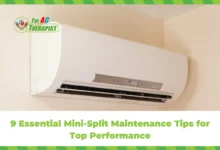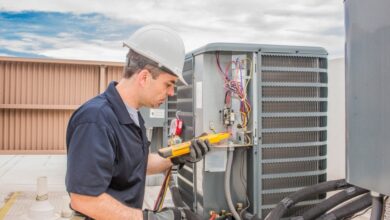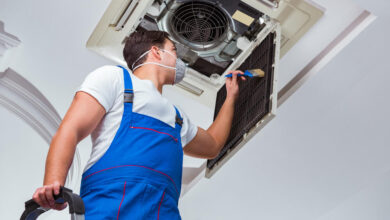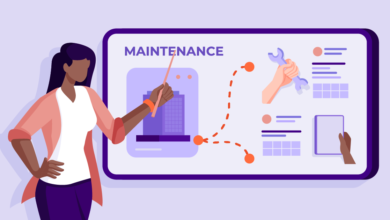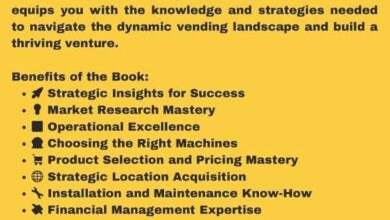The Ultimate Guide to AC Routine Maintenance
Sponsored Ads
Stay Cool and Comfortable Year-Round
As the summer heat intensifies, it’s essential to ensure your air conditioner is running efficiently and reliably. Regular routine maintenance is crucial for maximizing its performance, extending its lifespan, and reducing the risk of costly breakdowns. This comprehensive guide will provide you with all the information you need to keep your AC unit in top shape.
Introduction
Your air conditioner plays a vital role in maintaining a comfortable indoor environment, especially during the sweltering summer months. Like any other appliance, it requires regular attention to function at its best. Routine maintenance involves a series of inspections, cleanings, and adjustments that help identify potential issues and prevent premature failure.
By adhering to a regular maintenance schedule, you can reap numerous benefits, including improved cooling performance, reduced energy consumption, extended equipment life, enhanced air quality, and peace of mind.
Strengths and Weaknesses of AC Routine Maintenance
Strengths:**
- Enhanced Cooling Performance:** Regular maintenance ensures your AC unit operates at peak efficiency, providing optimal cooling capacity and maintaining a comfortable indoor temperature.
- Reduced Energy Consumption:** A well-maintained AC unit operates more efficiently, consuming less energy and reducing your monthly utility bills.
- Extended Equipment Life:** Routine maintenance helps prevent premature wear and tear, extending the lifespan of your AC unit and maximizing your investment.
li>Enhanced Air Quality:** Regular cleaning of the air filter and evaporator coil improves air quality by removing dust, pollen, and other allergens.- Peace of Mind:** Knowing your AC unit is in good working order provides peace of mind, especially during periods of high heat or humidity.
ul>Weaknesses:**
- Time and Effort:** Routine maintenance requires time and effort to schedule and perform, which may be inconvenient for some individuals.
- Cost:** Professional AC maintenance can involve a cost, especially if repairs or part replacements are needed.
- Dependent on Technician:** The quality of AC maintenance depends on the skill and expertise of the technician performing the service.
- Potential Disruptions:** AC maintenance may require turning off the unit for a period of time, which can be disruptive if performed during peak usage hours.
Despite these potential weaknesses, the benefits of regular AC routine maintenance far outweigh any drawbacks. By investing in proper maintenance, you can ensure your AC unit operates at its best, providing comfort and peace of mind for years to come.
AC Routine Maintenance Schedule
The frequency of AC routine maintenance depends on various factors, including the age of the unit, the operating environment, and the manufacturer’s recommendations. However, a general guideline includes:
Frequency Maintenance Task Monthly Change air filter Every 3 Months Clean or replace evaporator coil Annually Inspect and clean condenser coil Every 2 Years Inspect electrical connections DIY AC Routine Maintenance
Some basic AC routine maintenance tasks can be performed by homeowners with basic tools and skills. Here are some DIY tips:
- Change Air Filter:** Regularly replace the air filter located in the return air vent. It traps dust and allergens, improving air quality and protecting the AC unit.
- Clean Condenser Coil:** The condenser coil is located outside and accumulates dirt and debris. Use a garden hose to gently rinse the coil, removing any obstructions.
- Inspect Electrical Connections:** Check the electrical connections at the condenser unit for any signs of corrosion or loose wires. Tighten any loose connections.
Professional AC Routine Maintenance
For more comprehensive AC routine maintenance, it’s recommended to hire a qualified HVAC technician. They have the expertise and tools to perform the following tasks:
- Inspect and Clean Evaporator Coil:** The evaporator coil is located inside the air handler and can accumulate dust and mold. A technician will clean the coil thoroughly using a specialized cleaner.
- Inspect and Clean Condenser Coil:** A technician will inspect the condenser coil for any dirt or debris buildup. They will use a commercial-grade cleaner to remove any blockages.
- Inspect Electrical Connections:** A thorough inspection of the electrical connections ensures proper operation and prevents potential safety hazards.
- Lubricate Moving Parts:** Moving parts of the AC unit require periodic lubrication to reduce friction and ensure smooth operation.
- Check Refrigerant Levels:** A technician will check the refrigerant levels to ensure the unit has the proper amount for optimal cooling.
FAQs
What are the signs that my AC unit needs maintenance?
Reduced cooling capacity, increased energy consumption, strange noises, and unusual odors are all signs that may indicate a need for AC maintenance.
How often should I schedule AC routine maintenance?
The frequency of AC routine maintenance depends on various factors, but a general guideline is to schedule maintenance twice a year, once in the spring before summer and once in the fall before winter.
Can I perform AC routine maintenance myself?
Some basic AC routine maintenance tasks, such as changing the air filter and cleaning the condenser coil, can be performed by homeowners with basic tools and skills. However, more comprehensive maintenance tasks should be left to qualified HVAC technicians.
What is the average cost of AC routine maintenance?
The cost of AC routine maintenance varies depending on the size and type of unit, the company performing the service, and the location. However, a typical range is between $100 and $300.
What are the benefits of regular AC routine maintenance?
Regular AC routine maintenance provides numerous benefits, including improved cooling performance, reduced energy consumption, extended equipment life, enhanced air quality, and peace of mind.
What are the risks of neglecting AC routine maintenance?
Neglecting AC routine maintenance can lead to decreased cooling capacity, increased energy consumption, premature equipment failure, poor air quality, and potential safety hazards.
What should I look for when choosing an AC maintenance company?
When selecting an AC maintenance company, consider factors such as experience, reputation, licensing and certification, customer reviews, and warranty offerings.
How do I prepare for an AC routine maintenance visit?
Before an AC routine maintenance visit, ensure the unit is accessible, turn off the power to the unit, and clear any obstacles around the equipment.
What questions should I ask my AC technician during a maintenance visit?
During an AC maintenance visit, feel free to ask your technician questions about the unit’s performance, maintenance recommendations, and any potential issues that need attention.
What is the lifespan of an AC unit?
The lifespan of an AC unit varies depending on the type of unit, operating conditions, and maintenance practices. However, the average lifespan is between 10 and 15 years.
What are the different types of AC units?
There are various types of AC units, including central air conditioners, window air conditioners, portable air conditioners, and ductless mini-split systems.
How do I choose the right AC unit for my home?
Consider factors such as the size of your home, cooling capacity, energy efficiency, features, and budget when selecting an AC unit.
What are the energy efficiency ratings for AC units?
AC units are assigned energy efficiency ratings measured in SEER (Seasonal Energy Efficiency Ratio). Higher SEER ratings indicate greater energy efficiency.
Conclusion
Regular AC routine maintenance is essential for ensuring optimal cooling performance, reduced energy consumption, extended equipment life, improved air quality, and peace of mind. By adhering to a regular maintenance schedule and following the tips outlined in this guide, you can keep your AC unit running efficiently and reliably for years to come.
Neglecting AC routine maintenance can have detrimental consequences, leading to decreased cooling capacity, increased energy consumption, premature equipment failure, poor air quality, and potential safety hazards. Invest in regular maintenance to maximize the performance of your AC unit and enjoy a cool and comfortable indoor environment.
Remember to choose a qualified HVAC technician for professional AC routine maintenance. Look
- Inspect and Clean Condenser Coil:** A technician will inspect the condenser coil for any dirt or debris buildup. They will use a commercial-grade cleaner to remove any blockages.
- Clean Condenser Coil:** The condenser coil is located outside and accumulates dirt and debris. Use a garden hose to gently rinse the coil, removing any obstructions.
- Cost:** Professional AC maintenance can involve a cost, especially if repairs or part replacements are needed.
- Reduced Energy Consumption:** A well-maintained AC unit operates more efficiently, consuming less energy and reducing your monthly utility bills.



